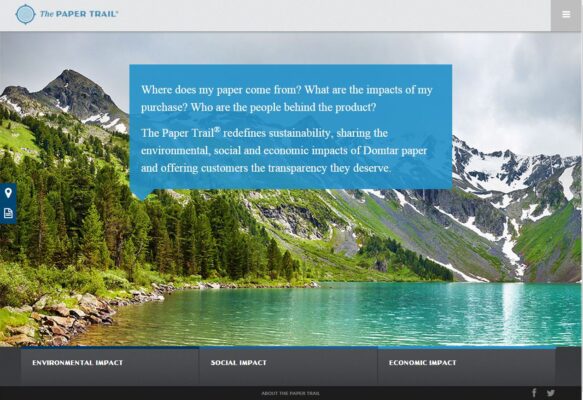How much do you really know about the products you use every day?
Guest Post Written By:
Dan Persica, Sustainability Communications Manager at Domtar, a Sustain Charlotte Bronze Partner

“If I asked you what the environmental impacts were of your latest purchase – whether it was the salad you had for lunch, the smartphone in your pocket or the notebook you jot notes in, would you know?
What about the more far-reaching impacts, such as where the item came from, who was involved in its creation and the conditions you’re effectively supporting by purchasing it?
Many of us wouldn’t feel confident in too much. Given the modern economy’s global marketplace and increasingly complex supply chains, these days you’re lucky to see a “Made in (enter country name here)” label.
The problem is this reveals precious little about a product’s origins, and even less about its wider environmental, social or economic impacts.
Domtar is a leading provider of a wide variety of forest-based products – everything from copy paper to best-selling titles to baby diapers. Yet as varied as these offerings are, the one common denominator is that they use wood fiber from responsibly managed sources.
In an effort to better illustrate the broad environmental, social and economic impacts of these ubiquitous products, Domtar developed a user-friendly transparency tool called The Paper Trail. Now, everyone from the casual customer who buys one ream of paper a year at their corner office supply store, to the corporate business that purchases truckloads of product each month can feel confident knowing more about these every day products.

For those concerned about environmental issues, the site provides impact estimates across five environmental categories:
- Water
- Fiber
- GHG Emissions
- Waste
- Renewable Energy
If social impacts are more your thing, visitors can read the history of the mills supplying their paper, view photo galleries of local landmarks in that area and even watch interviews with the small landowners that make up the first step of the supply chain.
Finally, the great economic story that comes with responsibly crafting products throughout North America is laid out, making the holistic view of sustainability apparent.
With our principal executive office located in the Charlotte metro area, Domtar has been a Sustain Charlotte partner since 2013 to help support long term sustainability in the region. Though we’ve been called the largest corporate citizen in the Carolinas you’ve never heard of, it is no secret that sustainability is core to Domtar’s mission. And we’re proud that this comes from the top, with our CEO insisting it be a source of competitive advantage.
At the end of the day, we feel that everyone benefits from increased transparency about the products they use and the practices of the company behind them, as it aids in helping make more responsible choices. That’s why we developed tools like The Paper Trail and are proud to support Sustain Charlotte’s mission to inspire choices that lead to a healthier and more vibrant community for generations to come.”
By Dan Persica
Sustainability Communications Manager, Domtar
Thanks for reading!
As a nonprofit, community support is essential for us to keep doing what we do — including providing free articles like this. If you found this article helpful, please consider supporting Sustain Charlotte.
Want to stay in the loop? Subscribe to our weekly newsletter and follow us on Instagram, Facebook, and Twitter.
